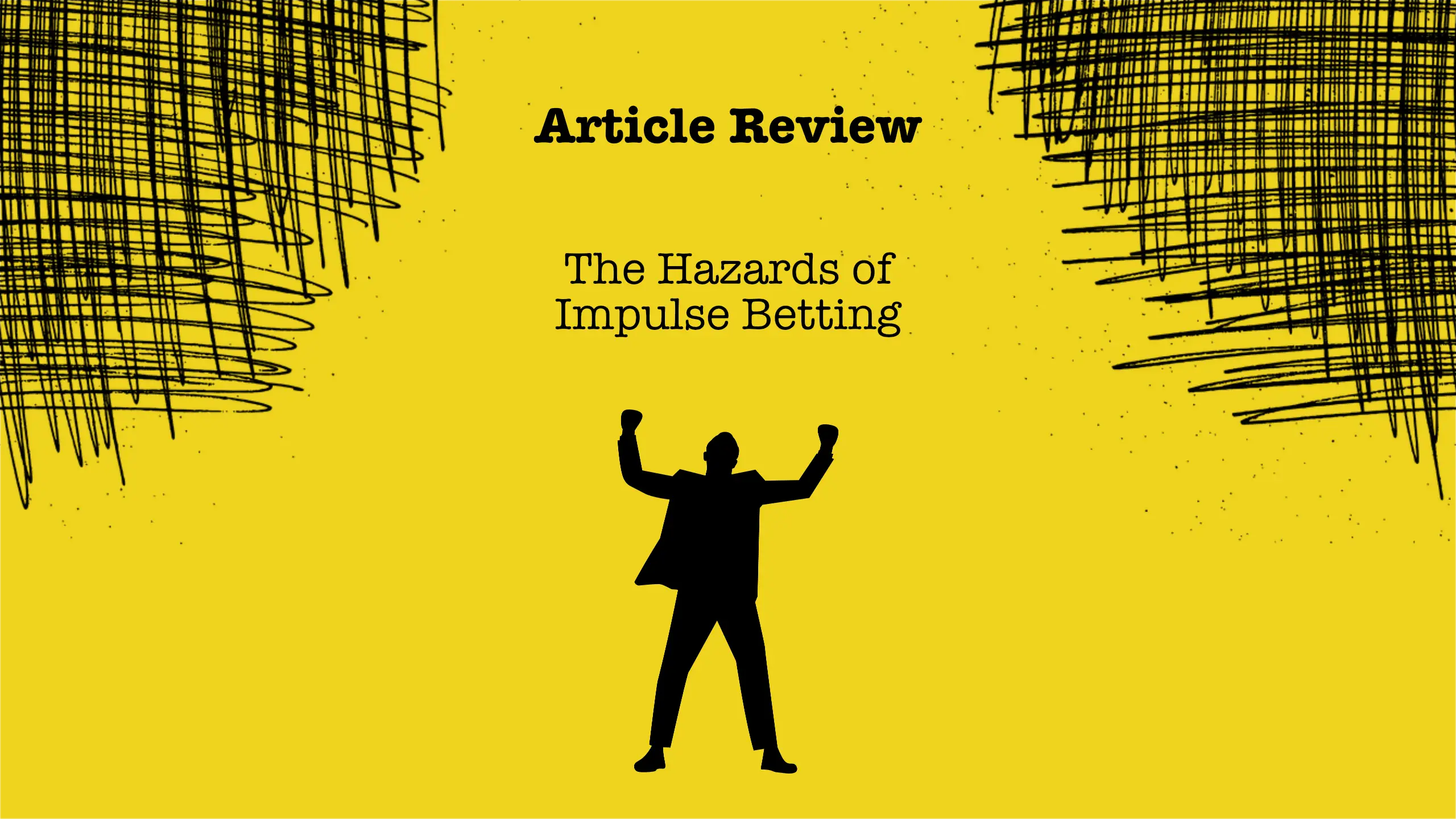Impulse betting — the rapid and unreflective placement of wagers — is emerging as a critical risk factor for gambling addiction, now recognized as a behavioral addiction by leading health authorities.
In On the Spur of the Moment: Intrinsic Predictors of Impulse Sports Betting (Hing, Li, Vitartas, & Russell, 2018), the authors investigate psychological, situational, and marketing influences that lead bettors to act spontaneously rather than strategically.
The study connects self-regulatory failure and environmental stimuli — such as online convenience, social influence, and promotional inducements — with the escalation from casual betting to problem gambling.
Key Concepts
1. Defining Impulse Sports Betting
Impulse sports betting refers to unplanned, spontaneous wagering conducted without deliberate thought about motives, consequences, or financial outcomes.
This form of betting is marked by:
- Immediate emotional reactions,
- Reduced cognitive reflection, and
- Failure of self-control mechanisms.
“Impulse betting reflects self-regulatory failure, impaired control, and betting more than planned.”
Such impulsive tendencies align closely with characteristics observed in addictive behaviors, where individuals struggle to regulate actions despite awareness of negative consequences.
2. Intrinsic Predictors of Impulse Betting
The research identifies general impulsiveness, higher problem gambling severity, and shorter betting history as key intrinsic predictors of impulsive betting.
Bettors new to gambling are more prone to impulsive behaviors, as they lack the experience or cognitive strategies to evaluate odds, risk, and self-regulation effectively.
Over time, this impulsivity can accelerate the transition from occasional betting to habitual gambling.
3. Extrinsic Determinants: Environment, Marketing, and Social Influence
Impulse betting is not merely a personal weakness — it is environmentally engineered.
Online Accessibility
The instant, anonymous, and convenient nature of online betting platforms enables bettors to act without pause or reflection.
In-play betting (placing wagers during live events) compounds the problem, as quick decision windows heighten emotional arousal and reduce deliberation.
Social Influence
Positive peer influence is the strongest situational determinant of impulse behavior.
Betting with friends, especially during televised sporting events, creates social reinforcement loops — moments of shared excitement that encourage unplanned betting.
“Bettors were more likely to make impulse bets when watching a match with other adults betting on it.”
Marketing Inducements
Betting inducements — bonuses, free bets, or humorous advertisements — are powerful behavioral triggers.
Promotions emphasizing ease of access or in-play opportunities have been found to disproportionately influence problem gamblers.
“Problem gamblers felt encouraged to place impulse bets by humorous ads that emphasized the ease of placing the bet and promoted in-play bets.”
4. Impaired Self-Control and Gambling Progression
Impulse betting embodies impaired control, a central feature in the progression from recreational gambling to addiction.
Psychological research (Blaszczynski & Nower, 2002; Jacobs, 1986) shows that repeated self-regulation failure reinforces habitual gambling patterns through dopaminergic reward cycles — similar to other forms of compulsive behavior.
Bettors who exhibit impulsivity are more likely to:
- Exceed planned spending limits,
- Chase losses,
- Engage in multiple betting accounts, and
- Justify behavior through overconfidence or social validation.
5. Gender and Emerging Trends
Although sports betting remains male-dominated, the female participation rate is rising, attributed to the perceived safety and anonymity of online gambling.
Online environments are seen as less stigmatizing and more accessible than land-based venues (Corney & Davis, 2010; Griffiths, 2001).
Moreover, research suggests that female gamblers are more susceptible to advertising than males (McCormack et al., 2014), raising concerns about targeted marketing in digital gambling environments.
6. The Social Profile of the Impulsive Bettor
In the Australian context — where the study was conducted — the typical sports bettor is:
- Male,
- Younger,
- Partnered,
- With lower weekly disposable income, and
- No university qualification.
This demographic pattern mirrors that of high-risk gambling populations, combining financial vulnerability with strong social and cultural exposure to sports betting promotions.
7. Policy and Prevention Implications
The findings underline the need for public health interventions and regulatory oversight to curb impulsive betting behaviors.
Recommended Measures:
- Restrict marketing inducements, particularly in-play promotions and humorous ads targeting risk-takers.
- Enhance platform-level tools for self-regulation — including spending limits, deposit caps, and time-out options.
- Promote awareness campaigns on the cognitive biases underpinning impulse betting.
- Support vulnerable demographics through educational and therapeutic programs focusing on financial literacy and self-control.
- Regulate online accessibility, introducing “cooling-off” delays between deposits and wagers.
Such strategies align with broader harm minimization frameworks, emphasizing prevention rather than prohibition.
Summary of Findings
| Category | Key Predictors / Determinants |
|---|---|
| Intrinsic | General impulsiveness, higher problem gambling severity, short betting history |
| Extrinsic | Online accessibility, social influence, marketing inducements |
| Behavioral Indicators | Impaired control, unreflective decision-making, excessive betting |
| Demographic Profile | Younger, male, partnered, lower income, no university degree |
| Policy Response | Self-regulation tools, inducement restrictions, health promotion strategies |
Academic Reference
Hing, N., Li, E., Vitartas, P., & Russell, A. (2018). On the Spur of the Moment: Intrinsic Predictors of Impulse Sports Betting. Journal of Gambling Studies, 34.
External References
- Binde, P. (2014). Gambling advertising: A critical research review. London, UK: Responsible Gambling Trust.
- Gainsbury, S. M., Russell, A., & Blaszczynski, A. (2013). Are psychology university student gamblers representative of non-university students and general gamblers? Journal of Gambling Studies, 29(2), 311–323.
- Hing, N., Cherney, L., Gainsbury, S., Lubman, D., Wood, R., & Blaszczynski, A. (2016a). Maintaining and losing control during Internet gambling: A qualitative study of gamblers' experiences. New Media & Society, 18(9), 1904–1922.
- Hing, N., Russell, A. M. T., Vitartas, P., & Lamont, M. (2017a). Demographic, behavioural and normative risk factors for gambling problems amongst sports bettors. Journal of Gambling Studies, 33(4), 1371–1388.
- Lopez-Gonzalez, H., & Griffiths, M. D. (2016). Understanding the convergence of online sports betting markets. International Review for the Sociology of Sport, 51(3–4), 365–381.
